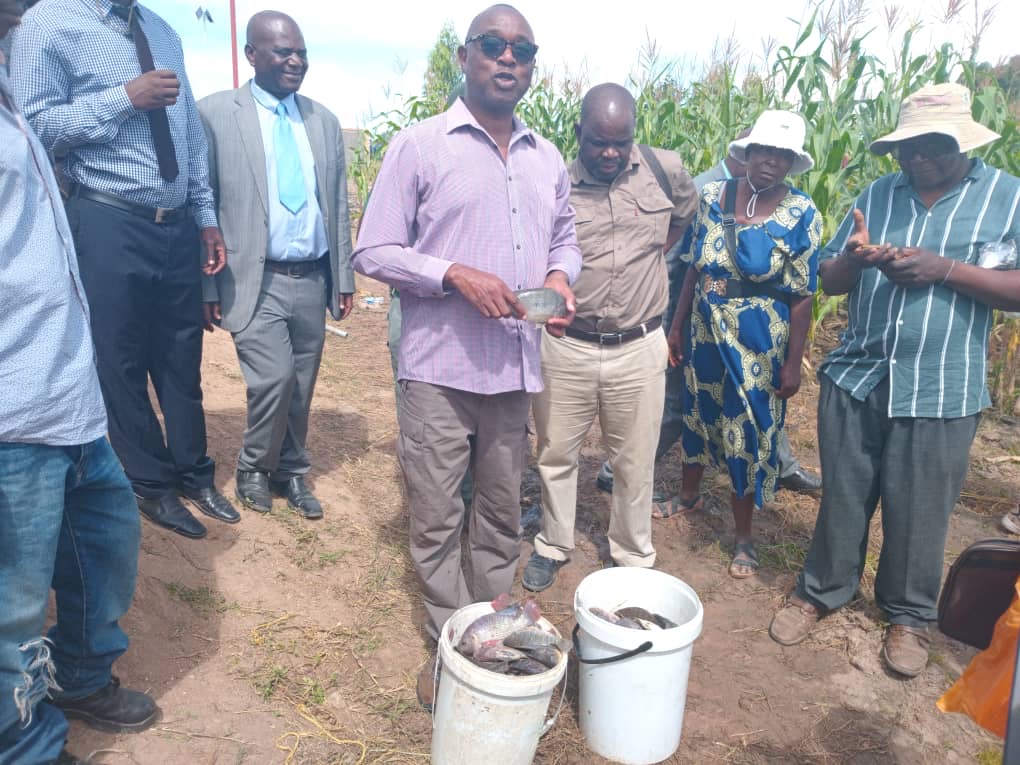By Edward Makuzva
In an era where education is evolving beyond traditional classrooms, innovative programs are making a profound impact on students’ learning experiences.
One such initiative is the #Fish4Schools project, which is redefining education by integrating fish farming into the curriculum. By combining hands-on learning with sustainable agriculture, this program not only equips students with practical skills but also fosters entrepreneurship, food security, and community development.
At Chinorumba High School in Zaka, ward 13, Zimbabwe, this initiative—launched under the Presidential Community Fisheries Scheme—is already yielding remarkable results.
From improving school attendance to boosting academic performance and empowering local farmers, the project is proving that education can be both transformative and sustainable.
Guest of Honor, Deputy Minister of Lands, Agriculture, Fisheries, Water, and Rural Development, Davis Marapira emphasised how this project is a powerful example of how education and entrepreneurship can work hand in hand to create a lasting impact as It reflects to the government’s commitment to rural development and food security.
“Today, we gathered in Zaka to harvest fish as part of the Presidential Fisheries initiative. Local villagers, school teachers, government officials, and students all came together to witness this significant milestone.
Furthermore, “I’m thrilled to witness the positive impact of the Presidential Community Fisheries project, a testament to the government’s dedication to rural development and food security. Let’s continue championing innovative initiatives like this that are transforming education and fostering entrepreneurship.
Moreover, “Today marked a milestone as the school held its first ceremonial fish harvest—150 kg sold at $4 per kg. The funds raised will be reinvested into school development projects, further enhancing learning and infrastructure”, Deputy Minister Marapira explained.
Key Milestones Achieved:
Boosted student attendance and significantly reduced dropout rates.
Improved quality of education, resulting in higher Grade 7 pass rates.
Encouraged sustainable fish farming practices while empowering local farmers.
Demonstrated strong potential for scaling up to enhance food security in the region.
Deputy Minister Marapira revealed that during his visit last year, President Mnangagwa not only established a garden under the Village Business Units initiative but also provided additional resources, including a borehole and two fish ponds. These ponds were later stocked with fish through the Ministry of Lands, Agriculture, Fisheries, Water, and Rural Development.
“In addition to championing fish farming through the Presidential Fisheries Initiative, the President is also driving broader development efforts that are transforming the community. Key among these initiatives are the construction of bridges to improve accessibility and connectivity across the region, and the rollout of solar-powered solutions in schools, ensuring a stable and eco-friendly energy supply for learning environments.
“Moreover, the government is working to enhance network connectivity in the area, bridging the digital divide and opening up access to information, online education, and communication tools for both students and local residents. These efforts reflect a holistic approach to rural development—one that prioritizes infrastructure, technology, and education to uplift communities and create lasting opportunities for growth”, said Dep Minister Marapira.
The local villagers extend their heartfelt gratitude to the Presidential Fisheries Initiative for its transformative impact on their community. This program has not only provided a sustainable source of food and income but has also created opportunities for skill development and economic empowerment.
“Through fish farming, families now have improved nutrition, students receive hands-on learning experiences, and the entire community benefits from increased economic activity. The villagers appreciate the government’s commitment to rural development and look forward to the continued growth of this initiative”, said a local villager Simbarashe Moyo.
The school head Florence Taguta expresses deep gratitude for the Presidential Fisheries Initiative, which has brought immense benefits to both students and the broader school community.
Taguta highlighted that this program has enhanced practical learning by equipping students with valuable fish farming skills, improved school nutrition, and generated income to support school development projects.
“Beyond education, the initiative has strengthened ties between the school and local villagers, fostering a sense of shared growth and sustainability. The school is proud to be part of this transformative project and looks forward to its continued success in shaping the future of education and community empowerment”, said Taguta.
Students have warmly welcomed the introduction of the fish farming program in their school, describing it as both exciting and empowering. They expressed their gratitude to the President for bringing such a practical and life-changing initiative to their learning environment.
Through the program, they are gaining hands-on experience in sustainable fish farming, learning valuable skills that go beyond the classroom, and understanding the importance of self-reliance and entrepreneurship. The students thanked the President for his visionary leadership and for investing in education that not only prepares them for exams but also for real-life opportunities.

